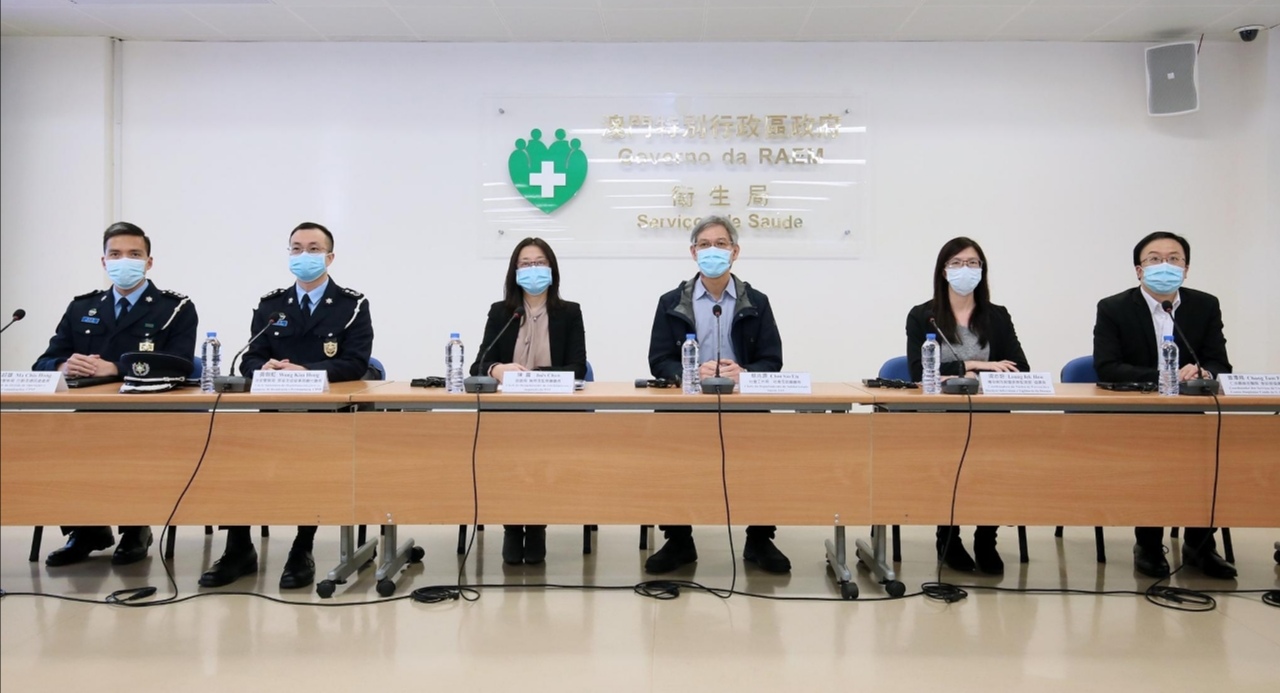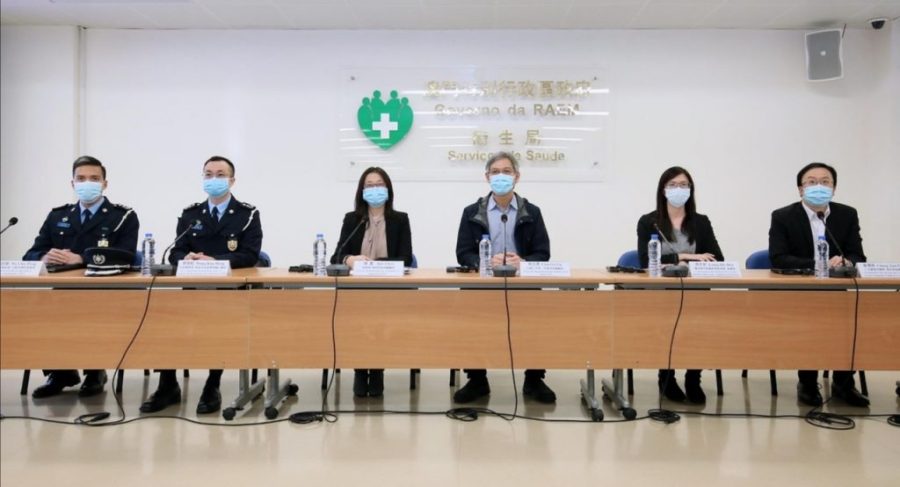Addressing Wednesday evening’s daily press conference about Macau’s novel coronavirus (COVID-19) situation, the Health Bureau’s (SSM) Control of Communicable Diseases and Surveillance of Diseases Department Coordinator Leong Iek Hou said that anyone, including local residents, visitors and non-resident workers, who had been in South Korea 14 days before their intended entry into Macau have to stay under medical surveillance for 14 days, a measure that started to be implemented at noon on Wednesday, considering that the number of confirmed cases in the East Asian country has “drastically” increased within a short period of time.
According to Leong, visitors and non-resident workers have to go into the 14-day quarantine at the Pousada Marina Infante hotel in Cotai and pay a fee, while local residents can choose to go into quarantine either in their home or at the hotel, depending on whether their flat can meet certain home requirements, such as whether they need to share a bedroom with family members.
The local government first announced the new measure in a short statement on Tuesday night, which said that anyone who had been in South Korea 14 days prior to their intended entry into Macau has to stay under medical surveillance for 14 days in a place in Macau arranged by the local health authorities, starting from 12 p.m. Wednesday, after coming to the conclusion that the COVID-19 epidemic in South Korea has “suddenly” deteriorated.
The statement on Tuesday night merely said that those who have completed the 14-day quarantine in the “specified” hotel would have to pay a fee. Tuesday night’s statement did not identify the hotel nor did it mention the amount of the fee.
Before Wednesday’s new measure, visitors arriving from South Korea – and other visitors who have been in the country 14 days prior to their intended entry into Macau – had to undergo a six-to-eight-hour medical examination at one of two stations (the Workers Stadium next to the Barrier Gate checkpoint for visitors arriving at the border checkpoints on the peninsula, and the Taipa Ferry Terminal for visitors arriving at the border checkpoints in Taipa and Cotai), a measure that had been in force since 00:00 on Monday until midday Wednesday.
According to previous government announcements, non-resident workers who arrive in Macau by air but had been in mainland China 14 days before their intended entry into Macau currently have to remain under medical surveillance for 14 days at Pousada Marina Infante and pay a fee of 5,600 patacas (US$700) – being lowered from the initially announced amount of 8,750 patacas, a measure that has been implemented since February 20.
During Wednesday’s press conference at the bureau adjacent to the public Conde de São Januário Hospital Centre, Leong elaborated on the new measure, which was first briefly announced in Tuesday night’s statement.
Leong said that if arrivals who had been in South Korea 14 days before their intended entry into Macau are found to have a fever or respiratory symptoms will be taken to the public hospital.
According to Leong, those arrivals who do not show any symptoms but have been in any of South Korea’s high-risk regions or venues – namely the city of Daegu and North Gyeongsang province, and the Shincheonji Church of Jesus – will be taken to the Public Health Clinical Centre in Coloane for 14-days quarantine.
Local residents who have not been in any of the high-risk regions in South Korea can choose to go into the 14-day quarantine in their home, while non-locals – namely visitors or non-resident workers – have to stay under the 14-day medical surveillance in the “specified” hotel (Pousada Marina Infante) and pay a fee, Leong said.
Leong said that non-locals who are unwilling to accept the 14-day quarantine can choose not to enter Macau.
Inês Chan Lou, who heads the Licensing and Inspection Department of the Macau Government Tourism Office (MGTO), said during the Wednesday press conference that non-locals who have to stay under the 14-day medical surveillance due to the new measure – which started to be implemented at midday Wednesday – will also have to pay the same fee of 5,600 patacas.
Police spot checks
Leong said that residents have to sign a document indicating that they agree to go into 14-days home quarantine. The document lists the requirements they must follow during their home quarantine. SSM officials will regularly phone the residents who are staying under the medical surveillance to ask them questions about their health status, Leong said, adding that Public Security Police (PSP) officers will carry out spot checks to see whether the person concerned is staying at home during the quarantine period.
Leong said that those in home quarantine found to have breached the official requirements will be moved to mandatory quarantine at Pousada Marina Infante and be held criminally responsible.
According to Leong, the official home quarantine requirements include: 1) the person is not allowed to go out or go to work or school, and 2) the person must have his or her own bedroom to stay alone and sleep there without any other family member in the room. Leong said that if the person considers that his or her family flat cannot meet certain requirements, such as that the person does not have his or her own bedroom, they can choose to opt for 14-day quarantine at Pousada Marina Infante, in which case they will be exempted from paying the 5,600-pataca fee.
For residents who have to go into the 14-day home quarantine, Leong said that SSM officials will not visit their home to check whether the flat meets the official requirements, and instead it is up to the person concerned to decide whether his or her family flat meets the requirements, before opting for home or hotel quarantine.
Locals can fly from S Korea to HK en route to Macau
Meanwhile, Chan announced during Wednesday’s press conference a measure taken in collaboration with the Hong Kong government, according to which Macau residents stranded in South Korea will be able to return to Macau via the Hong Kong-Zhuhai-Macau Bridge (HZMB) after flying back to Hong Kong from South Korea.
There are currently no flights between Macau and South Korea. The Hong Kong government currently bans anyone flying from South Korea– except Hong Kong residents – from entering Hong Kong.
According to Chan, under the measure, Macau residents who are in South Korea have to register by calling the Macau government’s Tourism Crisis Management Office (GGCT) on 2833 3000. Afterwards, the office will pass each resident’s ID information and flight information to the local police, who will then pass the information to Hong Kong’s Immigration Department and the relevant airline, only then will the local resident be able to catch the flight to Hong Kong.
Macau’s Immigration Department is run by the Public Security Police (PSP).
According to Chan, under the arrangement between the Macau and Hong Kong governments, after a Macau resident arrives at Hong Kong’s airport from South Korea, they will be transported by the Macau government from there to Macau via the delta bridge.
Chan said that the local Tourism Crisis Management Office has sent SMSes to mobile phones in South Korea being used by Macau residents, informing them about the new measure.
Chan revealed that the government has so far received 12 requests for help from local residents stranded in South Korea.
(The Macau Post Daily/Macau News)
PHOTO © Government Information Bureau (GCS)






